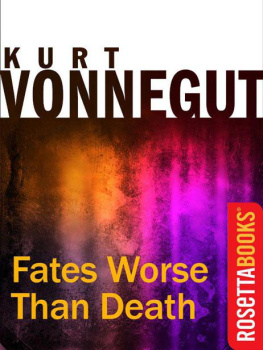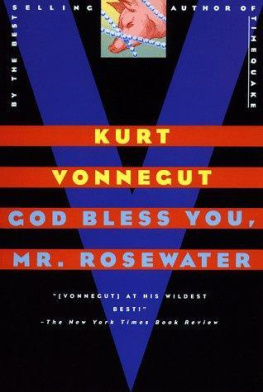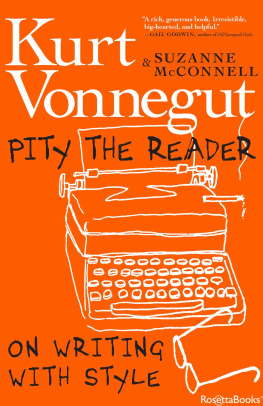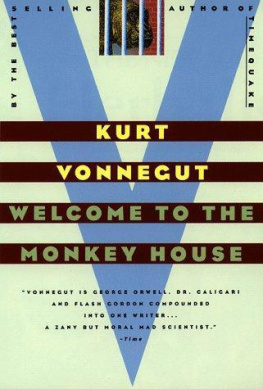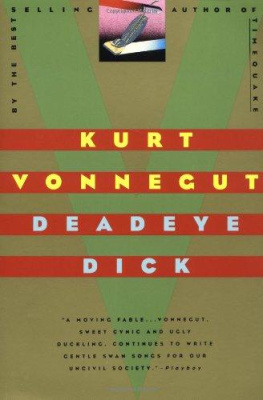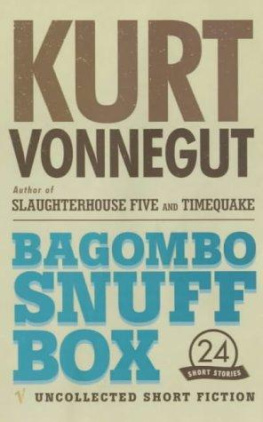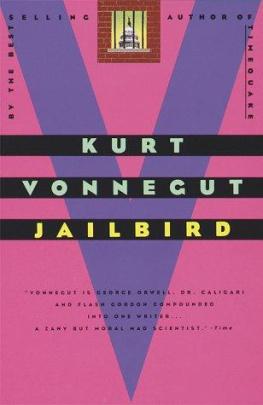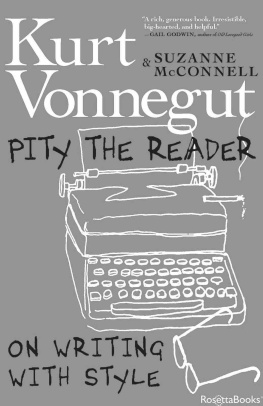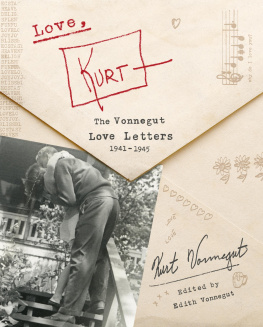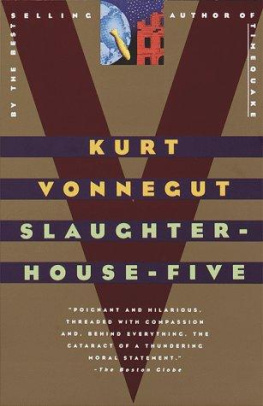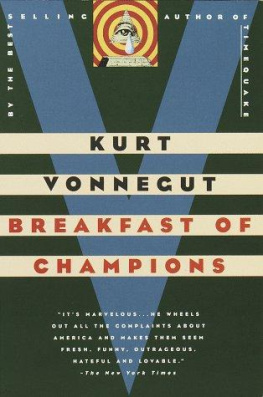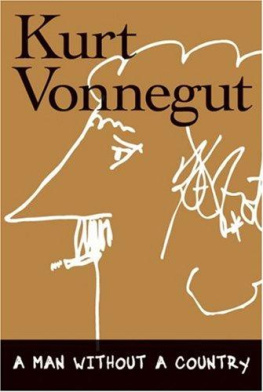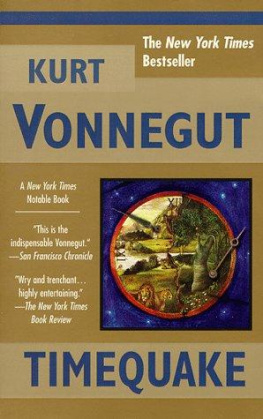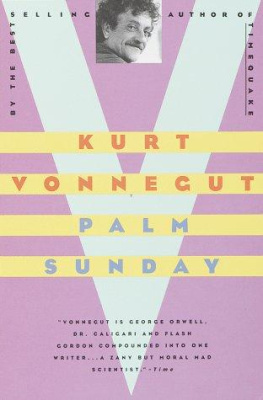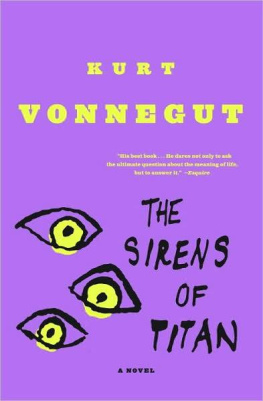Fates Worse Than Death
An Autobiographical Collage
Kurt Vonnegut
Copyright
Fates Worse Than Death
Copyright 1991 by Kurt Vonnegut
Cover art to the electronic edition copyright 2011 by RosettaBooks, LLC
The author gratefully acknowledges permission from the following sources to use previously published material, on the pages indicated: Architectural Digest (pp. 3740); The Franklin Library (pp. 45 48. copyright 1987, and pp. 129130, copyright 1990 by The Franklin Library. Franklin Center, Pennsylvania, for exclusive use in its Signed First Editions of Bluebeard and Hocus Pocus, respectively); Four Walls Eight Windows (pp. 56-59); Lears (pp. 113116), first published 1988) The Nation magazine/The Nation Co. Inc. (pp. 132137. copyright 1983); The New York Times Company (pp. 183187, copyright 1990 by The New York Times Company; reprinted by permission); Krochs & Brentanos (pp. 187188); Dell Publishing Group, Inc., and Mark Vonnegut (pp 205-207, afterword to the 1988 edition of The Eden Express)
Some material appeared previously, in slightly different form, in Architectural Digest. Esquire. Parade, and Time.
The author wishes to thank Dean Brelis, John F. Collins, the Reverend Paul Jones, Tom Jones, Mary T. OHare, and John Updike.
All rights reserved. No part of this book may be used or reproduced in any manner whatsoever without written permission except in the case of brief quotations embodied in critical articles and reviews.
Electronic edition published 2011 by RosettaBooks LLC New York
ISBN Mobipocket edition: 9780795318672
All persons living and dead are purely coincidental, and should not be construed. No names have been changed in order to protect the innocent since God Almighty protects the innocent as a matter of Heavenly routine.
In Memory of Kurt Vonnegut (Sr.)
O God who hast hitherto supported me, enable me to proceed in this labor & in the whole task of my present state that when I shall render up at the last day an account of the talent committed to me I may receive pardon for the sake of Jesus Christ. Amen.
SAMUEL JOHNSON,
diary entry for April 3, 1753,
when he was working on his
Dictionary of the English Language
April 3, therefore, might be called Writers Day.
Contents
PREFACE
We were on a sightseeing bus in Stockholm during an international congress of the writers organization P.E.N. (Poets, Playwrights, Essayists, Editors, Novelists) in 1973. I told Henreich Bll of a German veteran of World War II (then a carpenter of my acquaintance on Cape Cod) who had shot himself in the thigh in order to get away from the Russian Front but whose wound had healed by the time he got to a hospital. (There was talk of a court-martial and a firing squad, but then the Red Army overran the hospital and took him prisioner.) Bll said that the correct way to shoot yourself was through a loaf of bread, in order to avoid powder burns. That is what we laughed about. (The Vietnam War was going on then, during which many infantrymen surely considered wounding themselves and pretending that it had been done by an enemy.)
Later on (when we had stopped laughing) he said that the French writers Jean-Paul Sartre and Albert Camus came looking for German writers after World War II, saying in effect, You must tell us what it was like for you. (Bll, like Sartre and Camus, would win a Nobel Prize for Literature.) In 1984, a year before Blls death at the age of sixty-seven (one year short of my age now, and I smoke as much as he did), he invited me to take part in a dialogue about Germanness to be taped and edited for television by the BBC. I was honored. I loved the man and his work. I accepted. The program was a flop, fogbound and melancholy and mainly pointless, although it is still aired again and again on cable in this country when there is nothing else to show. (We are sort of packing material to keep a big box of junk jewelry from rattling.) I ask him what the most dangerous flaw is in the German character, and he replies, Obedience.
Here are the last words he would ever say to me in this life (and he was on two canes and still smoking like a chimney, and about to board a taxicab to the airport in a cold London drizzle): Oh, Koort, it is so hard, so hard. He was one of the last shreds of native German sorrow and shame about his countrys part in World War II and its prelude. He told me off camera that he was despised by his neighbors for remembering when it was time to forget.
Time to forget.
A preface is commonly the last part of a book to be written, although it is the first thing a reader is expected to see. Six months have passed since the completion of the body of this book. Only now am I stitching this coverlet, as my editor, Faith Sale, and I prepare to put the creature to beddy-bye.
My daughter Lily has turned eight during the interval. The Russian Empire has collapsed. All the weapons we thought we might have to use on the USSR we are now applying without stint and unopposed to Iraq, a nation one-sixteenth that populous. A speech our President delivered yesterday on the subject of why we had no choice but to attack Iraq won him the highest rating in television history, a record held many years ago, I remember, by Mary Martin in Peter Pan. Yes, and I provided answers that same yesterday to questions put to me by a British publication, Weekly Guardian, with these results:
Q: What is your idea of perfect happiness?
A: Imagining that something somewhere wants us to like it here.
Q: What living person do you most admire? A: Nancy Reagan.
Q: What is the trait you most deplore in others?
A: Social Darwinism.
Q: What vehicle do you own?
A: 1988 Honda Accord.
Q: What is your favorite smell?
A: What comes out the back door of a bakery.
Q: What is your favorite word?
A: Amen.
Q: What is your favorite building?
A: The Chrysler Building in Manhattan.
Q: What words or phrases do you most overuse?
A: Excuse me.
Q: When and where were you happiest?
A: About ten years ago my Finnish publisher took me to a little inn on the edge of the permafrost in his country. We took a walk and found frozen ripe blueberries on bushes. We thawed them in our mouths. It was as though something somewhere wanted us to like it here.
Q: How would you like to die?
A: In an airplane crash on the peak of Mount Kilimanjaro.
Q: What talent would you most like to have?
A: Cello.
Q: What do you consider the most overrated virtue?
A: Teeth.
K.V.
January 17, 1991
I
Here we have a sequel, not that anyone has clamored for one, to a book called Palm Sunday (1980), a collection of essays and speeches by me, with breezy autobiographical commentary serving as connective tissue and splints and bandages. Here we go again with real life and opinions made to look like one big, preposterous animal not unlike an invention by Dr. Seuss, the great writer and illustrator of childrens books, like an oobleck or a grinch or a lorax, or like a sneech perhaps.
Or a unicorn, not a Seuss invention.
(The real name of Dr. Seuss is Theodor Geisel. He was born in 1904 and I was born in 1922.)
When I went to Cornell University in 1940, I joined a fraternity (Delta Upsilon) which had murals by Dr. Seuss in its basement bar. He had drawn them in pencil long before my time. An artist in the fraternity made them bold and permanent with paint afterward.
(For those who do not know the drawings of Dr. Seuss: They depict animals with improbable numbers of joints, with crazy ears and noses and tails and feet, brightly colored usually, such as persons sometimes report seeing when suffering from delirium tremens. More commonly, I am told, people with d.t.s see rats.)
Next page
